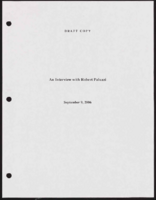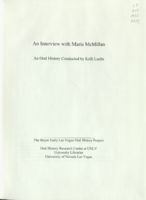Search the Special Collections and Archives Portal
Search Results

Transcript of interview with James M. Lancaster by Linda Voorvart, March 4, 1980
Date
Archival Collection
Description
On March 4, 1980, Linda Voorvart interviewed former senior safety engineer and power plant operator, James M. Lancaster (born July 5th, 1911 in Trinidad, Colorado) in his home in Las Vegas, Nevada. Lancaster explains how he first came to Southern Nevada from Mexico and Cuba. Lancaster then goes on to explain his occupational history, and the different jobs that he held in Southern Nevada, specifically at the Nevada Test Site.
Text

Transcript of interview with Bruce L. Woodbury by Stefani Evans, September 27, 2016
Date
Archival Collection
Description
As Bruce Woodbury reflects on his twenty-eight years as Clark County's longest-serving County commissioner (1981–2009) he recalls serving with about thirty different commissioners. Surprisingly, "only seven of us got major jail sentences." He ruminates how Federal Bureau of Investigation probes Operation Yobo in the early 1980s and G Sting in the early 2000s exposed several Clark County politicians who succumbed to greed. While Woodbury considers honesty in office a given, his values were not held by all of his colleagues. One Operation Yobo recording caught a fellow commissioner responding to the query, "How about Woodbury?" with, "No, you can't touch him with a ten foot pole." Woodbury remembers his "campaign guys really liked that." Apparently the voters did as well, as he consistently won re-election. The Las Vegas native, who was raised in the John S. Park neighborhood and attended Las Vegas schools, earned his Bachelor's degree at the University of Utah and his Juris Doctorat
Text

Emily McKinley interview, March 1, 1981: transcript
Date
Archival Collection
Description
On March 1st, 1981, Glorialyn Gutierrez interviewed Emily McKinley (b. April 28, 1930 in Las Vegas, Nevada) about her life in the Las Vegas Valley. McKinley begins by speaking about her childhood, her siblings and her extended family. McKinley gives a variety of anecdotes about being raised in Las Vegas, her family’s economic hardships and the house she grew up in. Lastly, McKinley talks about the businesses she owned with her husband, their hardships and her time working multiple jobs.
Text

Transcript of interview with Robert Paluzzi by Claytee White, September 5, 2006
Date
Archival Collection
Description
Claytee White interviews Robert Paluzzi on September 5, 2006.
Text

Paul Sogan interview, May 16, 1995: transcript
Date
Archival Collection
Description
Interviewer: Dennis McBride
Text

Transcript of interview with Frankie Perez by Elsa Lopez and Laurents Bañuelos-Benitez, November 5, 2018
Date
Archival Collection
Description
Frankie Perez (1986- ) is an individual that constantly found himself navigating two worlds, whether it was military versus civilian; female versus male; or being Latinx in the United States. As a result of this navigation, Perez has a unique perspective on our ever more complicated world that not many individuals possess. Perez served in the military during the Do Not Ask, Do Not Tell policy which made it difficult for someone dealing with gender identity, to seek out the proper support they need. Despite the policy, and other policies that were put in place afterwards to inhibit the transgender community in the military, Perez began his transition while still serving his country. In direct contradiction of popular opinion, Perez discovered that the military easily accommodated his transition. Outside of the military Perez is an active voice in the LGBTQ community. As a member of the LGBTQ, Latinx, and military community, Perez has a unique perspective that he uses to fight for both LGBTQ and Latinx rights. Currently, Perez is finishing his degree in gender and sexuality studies at UNLV. He hopes to use his education to help people have the difficult discussions and improve conditions for his communities.
Text

Louise Kirkwood interview, February 28, 1979: transcript
Date
Archival Collection
Description
On February 28th, 1979, collector Richard Probst interviewed Louise Kirkwood (born December 13th, 1925 in Kemmerer, Wyoming) at her residence in North Las Vegas, Nevada. In the interview, Mrs. Kirkwood discusses moving to Nevada and raising her family. She also discusses recreation in Nevada and her involvement in church activities.
Text

Transcript of interview with Kim Krantz by Joyce Marshall, February 26, 1996
Date
Archival Collection
Description
Kim Krantz arrived in Las Vegas in 1953. She came as a seasoned performer having danced in large productions in Chicago, Montreal, New York and Florida. Born Delores Kalcowski in Jersey City, New Jersey, she adopted the name Kim Perrin while working at New York’s Latin Quarter. She had always loved the West and jumped at the chance to take the Latin Quarter show from New York City to Las Vegas. She came for a two-week engagement at the Desert Inn Hotel. The show was held over at that property for three months, and then it moved to the Riviera Hotel and Casino. Bill Miller approached her to join a new production at the Dunes Hotel. He and Harold Minsky were preparing “Minsky’s Burlesque,” the first show to use women born in the United States in a nude show. She opened with the original cast and stayed for two years. Kim retired in 1957 after she married Danny Krantz, the Food and Beverage Manager for the Flamingo Hotel. She raised four children in Las Vegas, but never lost touch with th
Text

Patricia Lappin interview, February 26, 1980: transcript
Date
Archival Collection
Description
From the Ralph Roske Oral History Project on Early Las Vegas collection OH-01063. On February 26, 1980, Nancy Bright interviewed school teacher, Patricia Lappin (born April 14th, 1924 in Denver, Colorado) at Robert L. Taylor Elementary School in Henderson, Nevada. The interview covers Boulder City, Nevada around Hoover Dam. The two discuss the different gambling habits between Southern Nevada locals and Las Vegas tourists. During the latter half of the interview, the two speak at length about the impact of nuclear waste on Nevada. Lappin explains the unique issues that Southern Nevada faces as one of three states to accept nuclear waste.
Text

Transcript of interview with Marie McMillan by Kelli Luchs, September 15, September 23, October 1, & November 24, 2009
Date
Archival Collection
Description
From an early age, Marie McMillan displayed an adventurous sensibility, a characteristic that is revealed in how life unfolded for her. In this multi-part interview, Marie begins with her birth in 1926 California, and continues with stories of her childhood recollections of the Depression era, her longstanding closeness with Nanny, her maternal grandmother, and memories of Old Bent, her paternal grandfather. She enjoys a flirtatious vitality and attends college for a year. However, as World War II begins to infest the U.S., Marie finds herself falling for a young merchant marine named Duke Daly. They marry, have two children, and live a transient life moving about California and Hawaii as he goes to school, then seeks and finds employment in a postwar economy. By the late 1950s, the Daly household is stressed and begin to split time between California and Las Vegas. Marie holds positions that require security clearance and administrative talents. In 1961, Duke passes away a
Text
